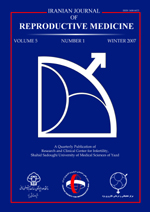
|
International Journal of Reproductive BioMedicine
Research and Clinical Center for Infertility, Shahid Sadoughi University of Medical Sciences of Yazd
ISSN: 1680-6433
EISSN: 1680-6433
Vol. 13, No. 8, 2015, pp. 503-506
|
 Bioline Code: rm15067
Bioline Code: rm15067
Full paper language: English
Document type: Research Article
Document available free of charge
|
|
|
International Journal of Reproductive BioMedicine, Vol. 13, No. 8, 2015, pp. 503-506
| en |
New single nucleotide polymorphism G5508A in the SEPT12 gene may be associated with idiopathic male infertility in Iranian men
Shahhoseini, Maryam; Azad, Mahnaz; Sabbaghian, Marjan; Shafipour, Maryam; Akhoond, Mohammad Reza; Salman-Yazdi, Reza; Gilani, Mohammad Ali Sadighi & Gourabi, Hamid
Abstract
Background: Male infertility is a multifactorial disorder, which affects approximately 10% of couples at childbearing age with substantial clinical and social impact. Genetic factors are associated with the susceptibility to spermatogenic impairment in humans. Recently, SEPT12 is reported as a critical gene for spermatogenesis. This gene encodes a testis specific member of Septin proteins, a family of polymerizing GTP-binding proteins. SEPT12 in association with other Septins is an essential annulus component in mature sperm. So, it is hypothesized that genetic alterations of SEPT12 may be concerned in male infertility.
Objective: The objective of this research is exploration of new single nucleotide polymorphism G5508A in the SEPT12 gene association with idiopathic male infertility in Iranian men.
Materials and Methods: In this case control study, 67 infertile men and 100 normal controls were analyzed for genetic alterations in the active site coding region of SEPT12, using polymerase chain reaction sequencing technique. Fisher exact test was used for statistical analysis and p<0.05 was considered as statistically significant.
Results: Genotype analysis indicated that G5508A polymorphic SEPT12 alleles were distributed in three peaks of frequency in both control and diseases groups. Categorization of the alleles into (GG), (GA), (AA) types revealed a significant difference between infertile patients (azoospermic and asthenospermic) and normal controls (p=0.005).
Conclusion: According to our finding we suggest that G5508A polymorphism in SEPT12 gene can affect spermatogenesis in men, the opinion needs more investigation in different populations.
Keywords
Male infertility; Polymorphism; SEPT12; Septin; Spermatogenesis
|
| |
© Copyright 2015 - Iranian Journal of Reproductive Medicine
Alternative site location: http://www.ijrm.ir
|
|
